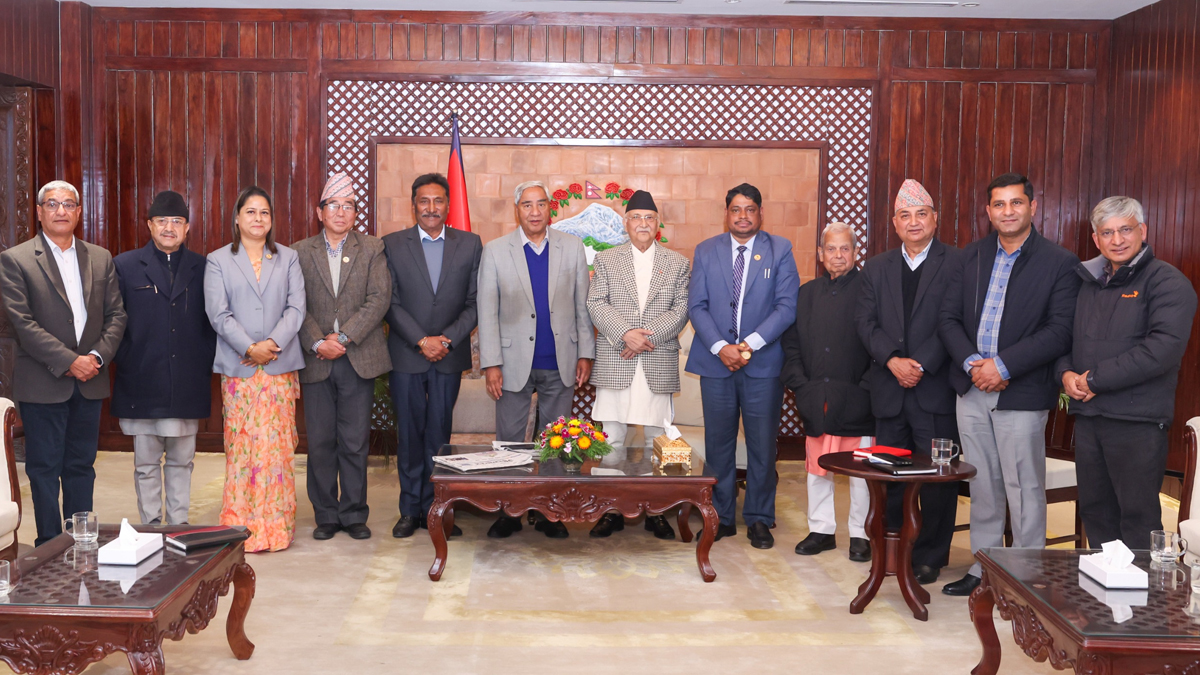On February 15, a meeting of ruling coalition parties was held at the prime minister's residence in Baluwatar.
The current government, headed by Prime Minister and CPN-UML Chairman KP Sharma Oli, is also supported by the Janata Samajwadi Party Nepal (JSP-Nepal). Therefore, the Upendra Yadav-led JSP-Nepal was also invited to the meeting.
When Bishnu Rimal, chief advisor to PM Oli, invited Upendra Yadav to the meeting, he was in Rajbiraj of Saptari. Yadav did not attend the meeting. Rimal then called JSP-Nepal Vice-chairman Raj Kishor Yadav.
According to a leader associated with JSP-Nepal, Raj Kishor said that he was preparing to attend the Kumbha Mela.
Rimal then asked both leaders, "Even if there's no agreement on the land-related ordinance, you don’t have any reservations regarding the other five ordinances, do you?"
According to another JSP-Nepal leader, both Upendra and Raj Kishor responded that they needed to sit down and discuss the other ordinances as well. In a conversation with Setopati, Raj Kishor said that the government had not held any discussions with them regarding the ordinances.
"No discussions have been held with us about the ordinances. The land-related ordinance must be withdrawn, only then can we discuss the other ordinances," Raj Kishor said. "The land-related ordinance can be rewritten and brought as a bill."
However, the February 15 meeting decided to present the ordinances other than the land-related one in the House of Representatives meeting on February 18.
Home Minister Ramesh Lekhak said after the meeting that the bills would move forward in the House of Representatives on February 18.
The meeting also decided to form a task force to hold further discussions on the land-related ordinance. However, the government has found itself in a difficult situation as the JSP-Nepal did not give a positive response regarding the other five ordinances either. The government couldn't table the ordinances on February 18.
A meeting of the UML parliamentary party held on February 16 also concluded that the ordinances could not be advanced before February 23 (Sunday).
"There's no possibility of advancing the ordinances before February 23, and it's uncertain when they will be tabled for approval even after that," UML Chief Whip Mahesh Bartaula said. However, the agenda for Sunday’s House of Representatives meeting did not mention the ordinances either. This indicates that the ruling coalition parties have not reached an agreement with the JSP-Nepal yet.
JSP-Nepal Chairman Upendra Yadav, who left for a visit to Qatar on February 18, is scheduled to return to Nepal only on Monday. Therefore, there have been no talks between the JSP-Nepal and ruling coalition leaders in the meantime.
UML Chief Whip Bartuala said that the government would get the ordinances approved by Parliament within the constitutional timeframe.
"The government is preparing to have the ordinances approved within the constitutional timeframe. According to the constitution, ordinances must be approved within 60 days and replaced with bills accordingly," he said.
He also said that preparations were underway to include the ordinances in the agenda for the upcoming Parliament meeting within a few days.
"The government is preparing to include them in the agenda for the Parliament meetings that will take place within the next few days," he said.
The government, which has a nearly two-thirds majority in the House of Representatives, had registered the ordinances in Parliament on January 31.
Getting the ordinances passed by the House of Representatives is not difficult because the votes of Nepali Congress and UML lawmakers alone would suffice for it. However, approval from the House of Representatives alone would not be enough as the ordinances must also be approved by the National Assembly, as per the Constitution.
Article 114 of the Constitution says that ordinances must be tabled in both houses of the federal Parliament after issuance, and they will automatically become inactive if not approved by both houses. The numbers of NC and UML in the National Assembly are not as comfortable as in the House of Representatives.
Of the 59 members in the National Assembly, only 28 are from the ruling coalition. NC and UML do not have a majority in the National Assembly, where the CPN (Maoist Center) is the largest party.
The government needs the support of lawmakers from the JSP-Nepal and Bamdev Gautam for a majority. In the National Assembly, the JSP-Nepal is represented by Pooja Chaudhary, Mrigendra Kumar Singh Yadav, and Mohammad Khalid.
Earlier, it was said that the ordinances would be presented for a decision in both houses of Parliament on February 6. However, as the JSP-Nepal and the Loktantrik Samajwadi Party (LSP) did not agree, the government had to back off at that time as well.
For ordinances to come into effect as acts, they must be replaced with bills and passed by both houses of Parliament within 60 days, and approved by the president.

